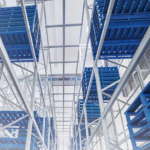The global logistics industry is undergoing a seismic shift, driven by the relentless march of automation. From automated warehouses and self-driving trucks to AI-powered route optimisation, advanced technologies are transforming the way goods are transported, stored, and delivered. This automation revolution offers a multitude of benefits that are fundamentally reshaping the industry, enhancing efficiency, accuracy, and cost-effectiveness while paving the way for a more sustainable future.
Enhanced Efficiency and Accuracy
One of the most significant impacts of automation is its ability to significantly improve efficiency and accuracy within the supply chain. Repetitive tasks, such as picking and packing, are now handled by robots with unwavering precision and speed. This not only increases output and throughput but also minimizes human error, leading to a dramatic reduction in errors and delays.
Optimized Inventory Management
Automated systems provide a real-time window into inventory levels and locations, offering unprecedented visibility and control. This granular data allows for optimized storage space utilization, minimizing stock outs and improving order fulfillment times. Moreover, predictive analytics powered by AI can analyze historical data and market trends, enabling better forecasting and demand planning, further enhancing resource allocation and cost savings.
Reduced Operational Costs
Automation delivers substantial cost reductions across various aspects of logistics operations. By automating routine tasks, companies can significantly reduce their dependence on manual labor, resulting in lower labor costs. Additionally, automated systems optimize energy consumption through efficient routing and space utilization, further minimizing operational expenses.
Improved Safety
Automation plays a crucial role in enhancing the safety of warehouse operations by removing human workers from potentially hazardous environments. Automated machines can handle heavy loads and operate in dangerous conditions, protecting workers from injuries and accidents. Additionally, automated systems can be equipped with safety features such as collision avoidance sensors, further reducing the risk of accidents.
24/7 Operations and Increased Uptime
Automated systems operate tirelessly, 24/7, allowing businesses to fulfill orders and deliver goods continuously. This increased uptime translates into faster delivery times and improved customer satisfaction. Companies can leverage this 24/7 operation to cater to global markets and expand their reach, increasing their competitive advantage.
Schedule a call with SmartlogitecX
Real-Time Visibility and Tracking
Automation provides a real-time window into the movement of goods throughout the supply chain. Businesses can track the location and status of their shipments in real-time, enabling them to make informed decisions and address any issues proactively. This transparency allows for improved communication with customers and stakeholders, enhancing trust, and building strong relationships.
Enhanced Customer Experience
The seamless integration of automation can significantly improve the customer experience. Automation ensures faster and more accurate deliveries, allowing customers to receive their orders promptly and efficiently. Additionally, real-time tracking information provides customers with peace of mind and enhances their overall experience.
Sustainability and Environmental Benefits
Automation contributes to a more sustainable logistics industry by reducing emissions and waste. Automated systems optimize routes and fuel consumption, leading to lower carbon emissions and a smaller environmental footprint. Additionally, automated warehouses can utilize energy-efficient technologies such as LED lighting and smart climate control systems, further reducing their environmental impact.
The Future of Logistics: Opportunities and Challenges
As technology continues to advance, the role of automation in logistics will undoubtedly expand. We can expect to see more advanced robots, AI-powered systems, and fully automated warehouses that further optimize the flow of goods and revolutionise the industry. However, it is crucial to acknowledge the challenges associated with automation. The implementation of these technologies requires significant investments and can lead to job displacement in certain areas. Companies must approach automation strategically, focusing on reskilling and retraining workers for higher-skilled roles to ensure a smooth transition and minimise social and economic impact.
In conclusion, automation is irrevocably transforming the logistics industry, offering a multitude of benefits that enhance efficiency, accuracy, and cost-effectiveness. As technology continues to evolve and businesses embrace this transformative force, we can expect a future where the logistics industry is not only more efficient and sustainable but also contributes to greater economic prosperity and an improved customer experience. By navigating the challenges and maximizing the opportunities presented by automation, we can harness the power of technology to create a thriving logistics ecosystem that benefits all stakeholders.
RELATED: Streamlining Your Supply Chain: The Power of 3PL Warehouse Automation
At SmartlogitecX, supported by WayZim Technologies, we prioritize your logistics needs. Pioneering in Warehouse Automation across Australia and New Zealand, we offer solutions that are not only advanced but also attuned to your specific requirements. With SmartlogitecX, you’re choosing a partner who understands the local market, backed by global expertise. Elevate your operations with our cutting-edge technology. Get in touch with the SmartlogitecX team today for a bespoke automation experience.



